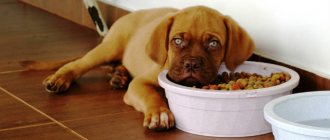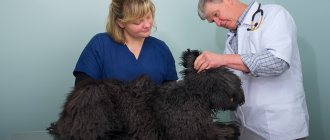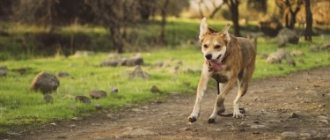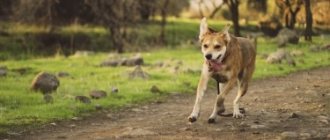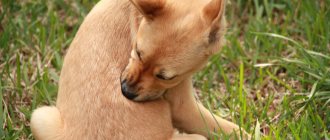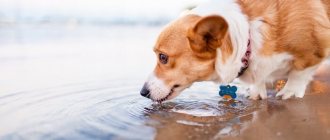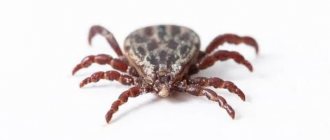Dirty or alien
A puppy may refuse to eat from a bowl if it smells foreign or simply unfamiliar and unpleasant odors. A typical situation: you washed the bowl using detergent, but you didn’t wash it well enough, which is why the dog smells chemicals and refuses to eat from such dishes.
There are cases when pets are very respectful and kind to other people's property and prefer to eat exclusively from their own bowl. In these cases, it will be enough to wash and rinse the bowl well in order to get rid of foreign odors.
Games on feelings
In real veterinary clinics there will be elements of “divorce”.
Veterinarians say that this is often determined by the client’s wallet. The greater the opportunity to pay for services and the more the owner worries about his pet, the more likely the animal will be prescribed additional immunostimulants, dietary supplements, water-soluble and fat-soluble vitamins, and special food. There are cases when this is really necessary (pedigreed, show animals, weakened after a serious illness). But it will be good if you ask your veterinarian in detail about the need for each appointment. Find out in detail about the results of the examination and analysis of your pet’s condition. Be persistent. Do not give in to attempts to intimidate you, be consistent in your questions. Consult a specialist who does not work at this veterinary clinic. If it turns out that half of the prescriptions are prescribed to enrich the veterinarian’s pocket, and not for the health of the animal, feel free to leave. And do not forget to leave a negative review about the organization - other owners may also suffer.
Fright
Fear is common in puppies. During puppyhood, the dog remembers any threat very well, and so well that it will be almost impossible to wean him from fear to a harmless bowl. Let's imagine a situation where you bought a new bowl with a stand, and a clumsy puppy knocked it over on itself, which caused a panicky fear of dishes.
Interesting: How do dogs see? Do dogs see colors? Description, comparison with a person, photos and videos
The dog will not approach this stand, even if hunger takes over. The complexity of this case lies in the fact that you simply do not know and do not understand what exactly the dog is afraid of, since such an event could have happened without your presence or even with the previous owner. To solve the problem, you will need to buy a completely different bowl so that it differs from the previous one in all respects.
Choosing a veterinary clinic
We determine the veterinary clinic where you plan to go. A big PR company doesn't promise quality. The price is explained by the huge amount of money invested in advertising and “signboarding” of the establishment.
It’s great if you can ask your friends about clinics where their pets were treated “humanely.” If you travel far from them, it may be worth sacrificing time for the health of your pet.
A few more tips on how to spot an unverified veterinary clinic:
- Refusal to provide certificates and licenses for veterinary activities.
- Strange and suspicious behavior of the veterinarian (inconsistency, flattery, attempts to intimidate, shouting).
- Prices are too low (compared to other organizations).
- Refusal to freely visit the veterinary clinic.
“We have a sanitary day”
Beware of scammers!
When you contact the veterinary clinic, you are informed: “we cannot accept you at this address, sanitary day/repair/inspection.” How much intelligence does a dispatcher have? The client is persuaded to have a veterinarian come to his home. The price does not change.
A veterinary clinic can exist purely nominally. And the invited “Aibolit” will not bear responsibility. There is a high probability of running into a person without a veterinary diploma or simply an unprofessional.
It is better to find time to visit the veterinary clinic on your own. This is safer for the animal.
Pet's spoiling
Far from being the least important reason would be arrogance. The pet is extremely demanding and is confident that you will feed it, in particular from your hands, and even better from the table, with harmful but tasty treats. Pampering is manifested in inviolability of the bowl and subsequent sitting and begging for food at the master's table. To solve this problem, it is enough to completely eliminate complementary feeding with all sorts of goodies. Leave the bowl of food for literally fifteen minutes; if you haven’t eaten it, then remove the bowl until the next meal.
Reasons for refusing dry food
Dry food is designed to contain all nutrients, mineral complex and vitamins. It happens that a dog stops eating its food and the reasons are unknown to you. It is important to observe your pet and then all the reasons will be clear, and you will be able to eradicate the problem forever.
Refusal of dry food, what it may involve and why this happens:
- A dog's body can react this way to stress. It is necessary to remove the irritant as much as possible.
- A dog may refuse to eat because it has recently been vaccinated.
- If your pet was not yet ready to be separated from its mother. You need to be patient and pay more attention to your new friend in order to adapt to new conditions.
- You have disrupted your feeding time and daily routine in general. The dog lives on a schedule, it has walks at certain times, and also feeding times. If you have lost the schedule, then it is better to return it by all means, and if it does not work out, you just need to wait and be patient with your pet. Imagine how hard it is for him now.
- The pet is very picky about food. If you previously gave one brand of food, and now you want to switch it to another, you need to transfer it gradually. Over the course of a week, add more and more new food to the old one, the pet will get used to it and start eating the new dry food.
- If your pet previously ate only food you prepared. In this way he shows you that he does not want to eat pellets and in general he does not like it all. It's a matter of habit for the dog. With time and patience, this habit can change. In order to fully switch your dog to dry food, you will need to first try giving him canned food (dog food) or soak the dry food in water.
There are also a number of other reasons to which your pet reacts with refusal:
- Metabolism is disrupted.
Are you feeding your pet? He may refuse dry food because he knows that you will give him something anyway.
- If you continue to feed natural food and dry food, the pet will definitely choose the option it likes more, and it will not be dry food.
- Allergies to components from the food composition, this very often happens with artificially bred breeds.
- If your pet is sick, has an infection or parasites.
- A chronic disease that has become more active.
- When changing baby teeth, a great way to help avoid pain is to soak the dry food in water.
- Oral diseases can completely destroy a dog’s appetite.
be careful
Very often, the character and fastidiousness of a puppy or even an adult dog are very specific; sometimes such refusals can simply be the whims of your pet, which cannot be followed.
The pet takes food out of the bowl and eats it exclusively from the floor
This problem is quite common. The dog pulls out and scatters food, after which it smears it on the floor. Or he pulls out a piece and drags it to a secluded place. This behavior quickly gets boring for the owners, due to the need to constantly wipe and wash the floors. This pet behavior may be caused by the following reasons.
Interesting: Why does a dog eat grass? Reasons, photos and videos
Instinct is from the earth, it is inherited: from generation to generation. You can’t argue with genetics, and in this case you should resort to chopping food, or seek help from a canine specialist.
The desire to eat the most delicious food first
The pet takes the pieces of meat out of the bowl and places them on the floor, thereby separating the different ingredients of the food. Dealing with this problem is quite easy, try cutting the meat into smaller pieces, then stirring thoroughly, the result will be noticeable immediately. If the dog chooses grains, try cooking the porridge until smooth.
Fear of losing a tasty morsel
This problem comes to light when you have several pets at once or if the dog was brought from a kennel where it had to share with its neighbors. The pet chooses a piece for itself and reflexively pulls it away from the place where the bowl is located in order to avoid further sharing.
In this case, as in the previous one, the solution lies on the surface. You just need to mix and grind the large ingredients of your food so that your pet simply has nothing to pull out.
Don't let him steal food, and encourage him to eat from the bowl. You can and should also try feeding in very small portions so that everything is eaten at once. Stretch out this process of eating for about fifteen minutes; after a few such sessions, the dog will learn to eat from a bowl and will stop dragging and hiding with food.
When to see a doctor
An animal can go without food for quite a long time. As a rule, 1 or 2 days of fasting does not have a detrimental effect on the health of the pet, but if the dog refuses food for more than 2 days, loss of appetite is accompanied by other signs, the alarm should be sounded - the animal is sick.
Immediate assistance from a veterinarian is required if loss of appetite occurs with the following symptoms:
- feverish conditions;
- diarrhea (with mucus, blood);
- pallor, yellowing of the mucous membranes;
- purulent discharge from the nose, eyes;
- vomiting with blood, bile, foam;
- unsteadiness of gait, convulsive conditions;
- severe pain in the animal's body;
- constant lying of the dog on one side;
- disturbance of the urination process (increased, decreased or complete cessation of urination);
- refusal of water.
Some owners, on the advice of their friends or relatives, begin to self-medicate the animal and make fatal mistakes. One of the most common tips for a quick recovery for a pet is to pour vodka into the dog’s mouth. This should not be done under any circumstances, because an alcohol-containing liquid will not cure a sick dog, but will cause a burn to the mucous membrane of the esophagus and stomach.
A dog that has no health problems will have an excellent appetite. In cases where an animal is bothered by something and refuses any food or even treats, immediate action must be taken. Treating your pet yourself using medications intended for humans, as well as traditional medicine recipes, is strictly prohibited. A sick friend must be shown to a veterinarian, who, based on the diagnosis, will select an effective treatment for the animal and return the dog to a good appetite.
Important points
- Refusal to vaccinate. This is dangerous for the animal and all those who will come into contact with it (people). Vaccination is a scientifically proven method of preventing many infectious diseases. Get your animal vaccinated by a trusted veterinarian (or with his approval yourself). It is important to get vaccinated against rabies - this is a fatal disease induced by the Rabies lyssavirus virus, which cannot be cured, but can be prevented.
- Anesthesia - inhalation, intravenous, anesthesia - epidural, conduction. They are necessary so that the animal does not suffer, to prevent painful shock. The veterinarian’s “hands on” are important here - both overdose and weak anesthesia lead to serious consequences (shock, poisoning, death) for the animal.
- Sterility, antiseptic. If you see that the veterinarian does not follow the rules of antiseptics (reuses disposable syringes, diapers, bandages, does not treat hands with antiseptic after contact with the previous animal), the best choice would be to contact another veterinarian.
- Important medicines:
- Antibiotics - amoxicillin, tilozil, trimethoprim, sulfadiazine, lincomycin, marbofloxacin;
- Antipyretics - paracetamol, salicylic acid preparations, antipyrine, butadione, amidopyrine;
- Anti-inflammatory drugs - vedaprofen, choline salicylate cycloferon, aspirin;
- Anesthetics - novocaine, lidocaine, dicaine, trimecaine;
- Hemostatics - fibrinogen, thrombin, vikasol, phytomenadione, calcium chloride, etamsylate;
- Antiparasitic - praziquantel, aversectin, albendazole, ivermectin, fluralaner.
If you care what happens to your pet, you should not neglect appointments.
Don't let unverified veterinary clinics endanger your pet and profit from their owner's feelings! If you have time and desire, it is worth trying to achieve justice in case of violation of ethical or legal standards.
Reason #6: She exhibits compulsive behavior.
Solution:
In rare cases, digging in a bowl of water can be a form of compulsive behavior. Talk to your veterinarian if you suspect this is the cause of her digging.
What to do if your dog is stung by a bee
4 Common Myths About Pet Sheltering
6 Common Myths About Dog Behavior
6 Ways to Strengthen Your Bond with Your Dog
More on Vetstreet
- How to Interpret Your Dog's Growls
- Stop your dog from pulling on clothes
- Pit Bull Videos That Will Make You Laugh, Smile and Cry
- 5 Ideas to Make the Most of Summer Dog Days
- Meet 18 designer dog breeds
More on Vetstreet:
- Why my dog? digging?
- Never leave pets in hot cars
- Why is my cat chatting to birds?
- 5 Ways You're Feeding Your Dog Wrong
- Train your dog to stop jumping on people
Source
The role of water in the dog's body
Water plays an important role in a dog's body. It ensures the normal functioning of the vascular and digestive systems, and is responsible for the condition of the skin, wool, and mucous membranes. A normal volume of fluid helps eliminate toxins, and in hot weather, water participates in the process of thermoregulation due to gradual evaporation. Moisture is part of the connective tissue, due to which the joints soften and movements become easier.
Dehydration for more than 12 hours begins to affect the pet's condition. He becomes lethargic, movements and metabolism slow down. Thirst is especially dangerous in hot weather - the temperature balance is disturbed, which is fraught with serious complications from the cardiovascular system.
How to find out the truth
Another possible way for veterinarians to make dishonest money is to conceal the diagnosis. Let's say a veterinarian discovers a malignant tumor in a cat. But if he says that the tumor is benign and treatable. A housewife who dotes on her pet will give money for already useless procedures, medications and surgical interventions.
The veterinarian may deliberately “downplay” the diagnosis in order to earn more money. If something doesn't add up, insist on clarification. There is no need to be intimidated by unfamiliar terms - take a short break and try to find information on the Internet.
You are free to leave (or threaten to do so) to another clinic at any time.
Make sure that the veterinary clinic is honest - get tested in an independent laboratory.
Justice
What to do if an animal was injured as a result of unprofessional actions of a veterinarian:
- Write an official complaint addressed to the head of the clinic.
- File a complaint with the city veterinary department.
- You can contact Rospotrebnadzor.
- Contact a lawyer for help
The Law “On the Protection of Consumer Rights” and Article 245 of the Criminal Code “Cruelty to Animals” are the grounds for considering claims regarding the work of veterinary clinics.
Saving
What to do if funds are limited and your pet needs medical care:
- Some procedures can be carried out independently. Giving a drug injection to a cat or dog is not difficult. Dressing uncomplicated wounds is also sufficient. Ask your veterinarian to teach you.
- How to properly give a pill to an animal: hide it in a lump of tightly rolled minced meat. If the animal bites through the decoy, you can crush the tablet and dissolve it in water, milk, liquid porridge, or food.
- If an animal has been prescribed a course of vitamins or some other non-medicinal but expensive drugs, it may be worth finding analogues at a lower price.
- There are various benefit programs in which you can participate. This could be, for example, sterilization, castration, or vaccination of an animal.
Catsbri
Roxanne_Bryan |
Editor-in-Chief | Email While some dog behaviors seem confusing to us humans, they are often quite logical to a dog. Digging in water dishes is one of those mysterious habits. Why would a dog splash water everywhere instead of drinking? Fortunately, many dogs outgrow dish digging, but some continue the behavior beyond puppyhood.
Check out our photo gallery below to learn about six possible reasons for digging for dog food and what you can do to curb the habit.
